#Works Cited
Explore tagged Tumblr posts
Note
What's the ***** tag?
***** is a special little guy whom i will one day successfully entrap in either a cursed amulet or an eternal labyrinth and then study him like a bug in a glass jar, hope this helps <3
#i fear i cannot be any more specific or the sniper watching my every post will fire more than a warning shot through my hoop earring#if you catch my drift (and if you don't i'll find the post i'm referencing bc it's quite good)#he will be well taken care of i assure you#it's just. he activates my prey drive like no other i really don't know how to describe it beyond the rachel weisz daniel craig kink post#i want to follow him around a lavish sprawling estate with a shotgun is what i mean by that batshit insane phrase btw#sorry this post comes with a works cited#was this helpful at all. probably not <3 sorry <3#a post#asks#*****#(i have tagged the posts referenced with -> )#works cited#where's that video of someone punching the shit out of a weird rubber pig and dropping it on the sidewalk bc that's how i feel about him in#a normal and respectful way
4 notes
·
View notes
Text
I trust nonfiction books so much more when I can flip to the back and see not only a glossary but an entire works cited section that's at least a good 6 pages long, and it's even formatted by chapter so you know exactly which section to reference??? Amazing. Show stopping. Would trust this random human with my nonexistent children.
2 notes
·
View notes
Text
Live fast die young leave an extensive list for further reading
5 notes
·
View notes
Text
hang on i gotta add that to my quirks cited real quick
4 notes
·
View notes
Text
How to use Wikipedia as a resource and research tool or guide for academic citation:
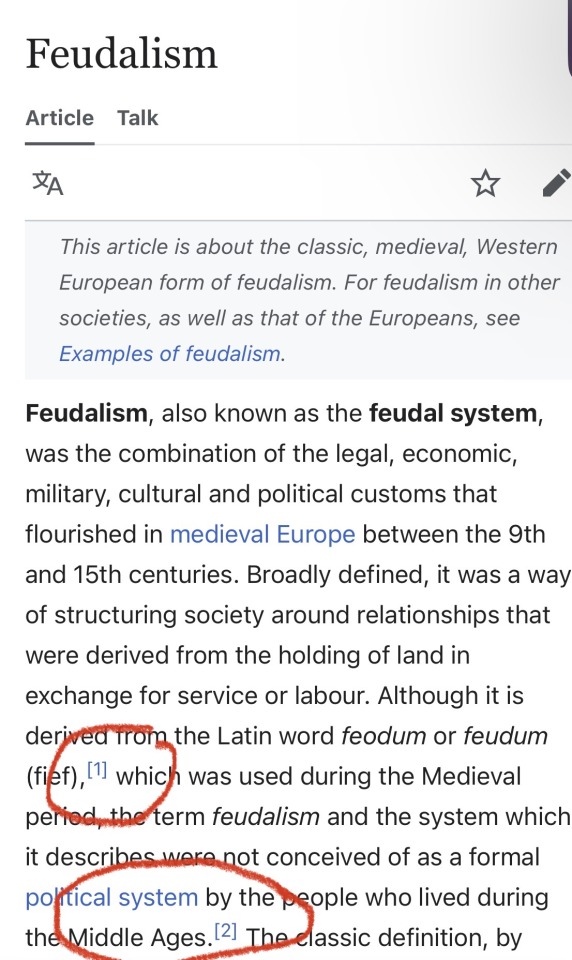
Wikipedia articles will include footnotes in the form of these blue highlighted numbers
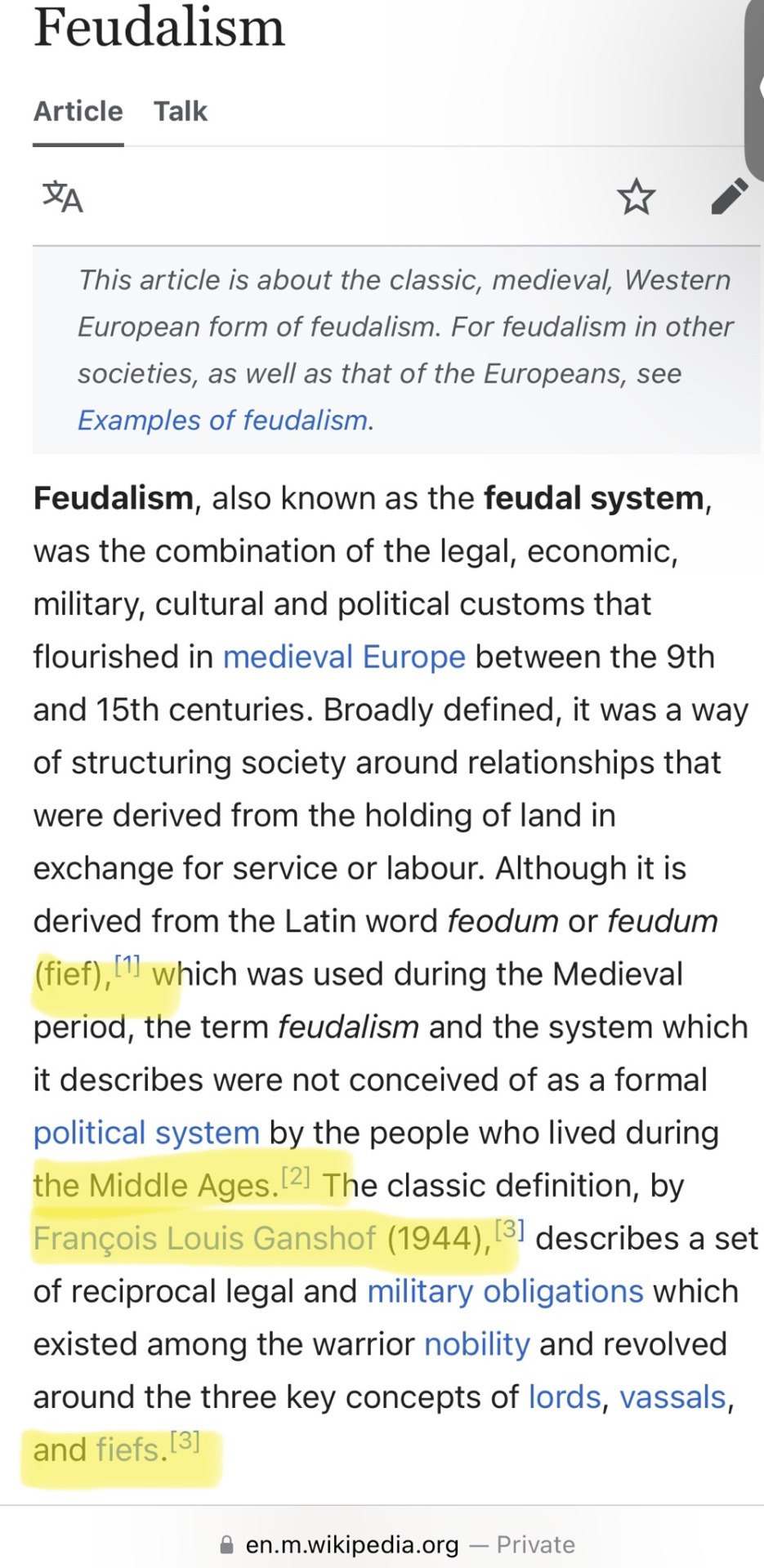
This indicates that there is a resource that can be found for this information. This means that you can find where the person who wrote the article got their information.
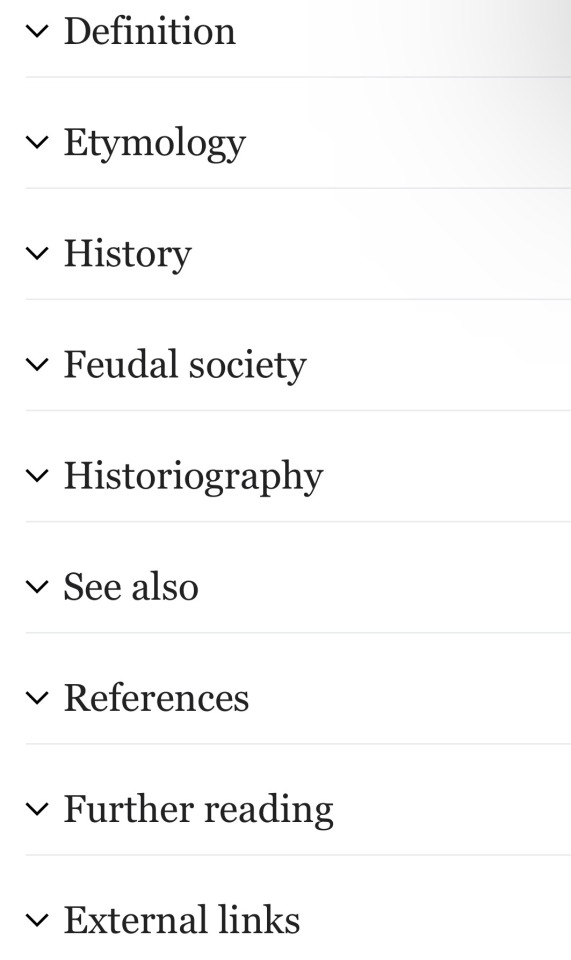
Simply scroll down to the bottom of the page and you’ll find these options for more information.
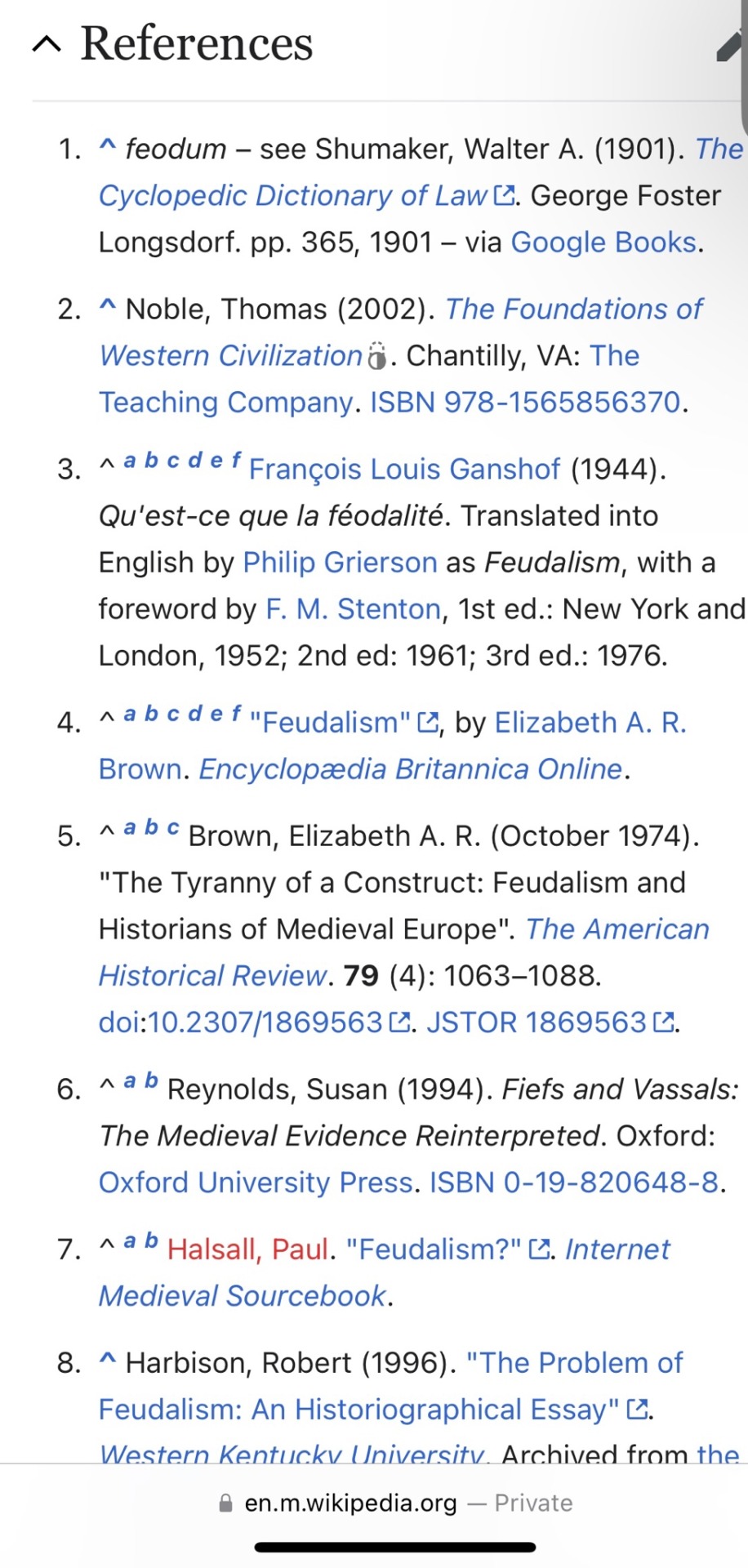
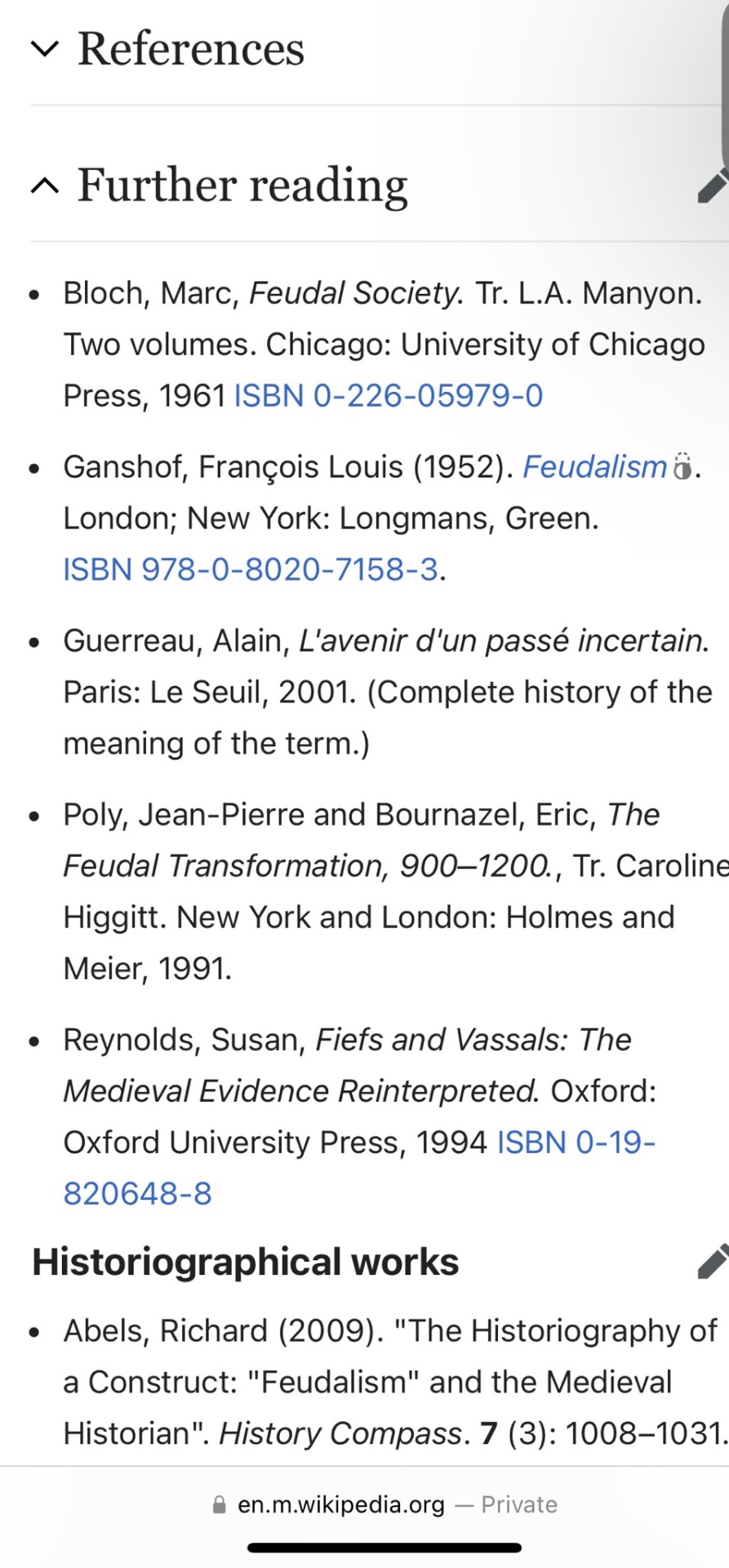
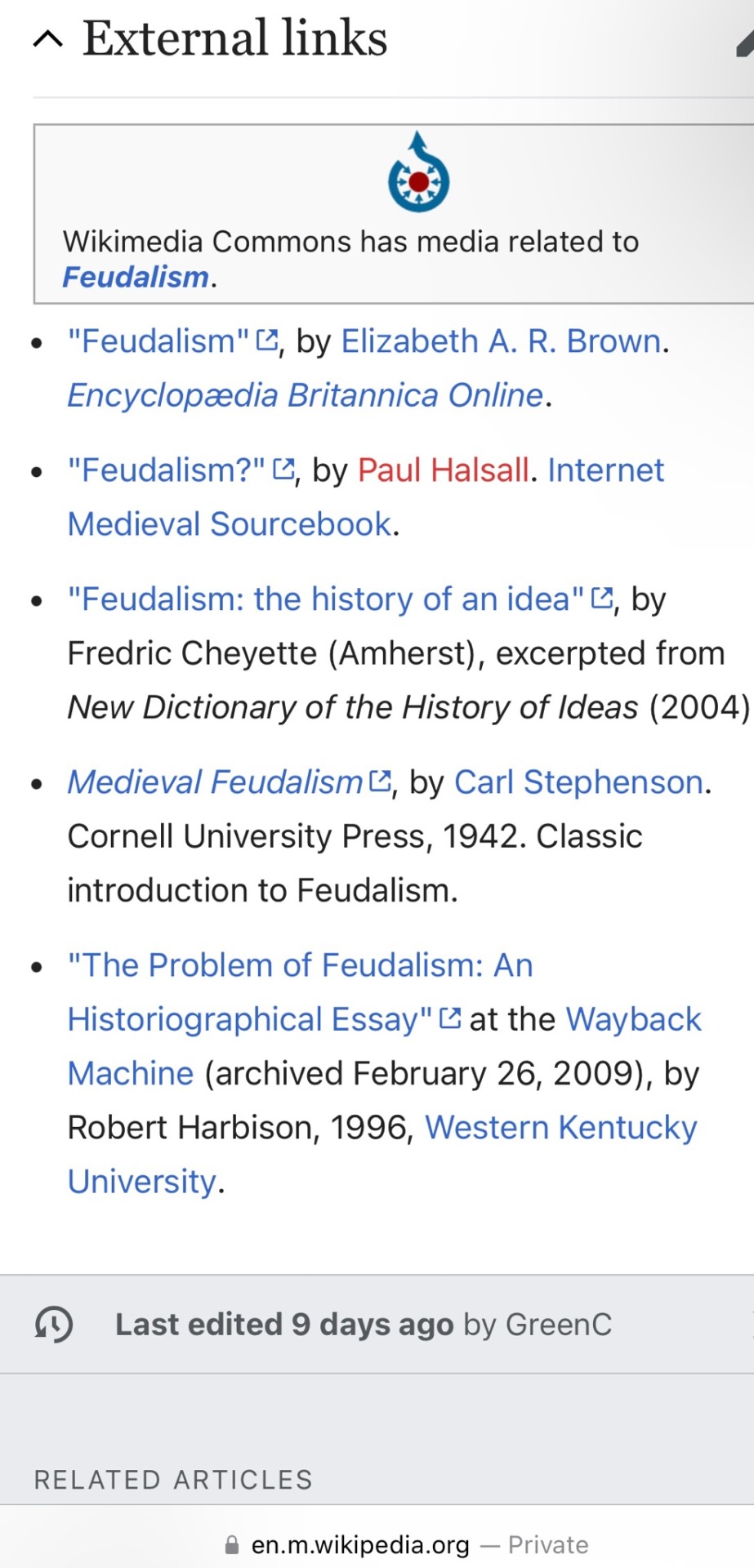
Use these as a starting point for your research.
For example, you could look up Thomas Noble’s “The Foundations of Western Civilization”. Check if you can find information online or get help from a local library. Librarians love helping with these kinds of projects.
By looking at a Wikipedia article, you now have a starting point for your own research. It saves you time and a headache from trying to figure it out yourself. Wikipedia provides a summary of information, a hub of general knowledge. It can help you understand the basics, but it is not specific or credible enough to be on your paper’s Works Cited page.
BUT: you can use it to help find the credible sources you need.
**double check all resources & good luck with the impending onslaught of AI misinformation
If I may, I must make the gentle request that people consult Wikipedia for basic information about anything.
I’m not entirely sure what’s going on, but more and more people coming to me saying they can’t find info about [noun], when googling it yields its Wikipedia entry on the first page.
I’ve said it before, but I’ll gladly say it again: You can trust Wikipedia for general information. The reason why it’s unreliable for academic citations is because it’s a living, changing document. It’s also written by anonymous authors, and author reputation is critical for research paper integrity.
But for learning the basics of what something is? Wikipedia is your friend. I love Wikipedia. I use it all the time for literally anything and everything, and it’s a huge reason why I know so much about things and stuff.
Please try going there first, and then come to me with questions it doesn’t answer for you.
#Wikipedia#wikiposting#wikipeida#resources#resource#research#works cited#academicwriting#academic research#academic assignments#light academic aesthetic#dark academic aesthetic#school#learning#paper#papers
32K notes
·
View notes
Text
Works Cited Page
“Elder Scrolls | Fandom.” Elder Scrolls | Fandom, https://elderscrolls.fandom.com/wiki/The_Elder_Scrolls_Wiki. Accessed 3 Dec. 2024.
"The Elder Scrolls IV: Oblivion." Developed by Bethesda Softworks, 2006;
0 notes
Text
Am I obsessive, or am I just OLD
I have recently started writing a more formal, and long-form newsletter/blog.
This is where some of my longer, narrative and meaty posts will live.
On the newsletter/blog I can be much more clear about in-universe vs IRL ME topics. I don't need to use my color-coding hack.
Hmm, I wonder what life would be like if I color were not such a limited resource. I bet there is a world that is much more vibrant than my grey world. I wish I could afford a BrightLight to at least make feeding myself easier. -- Lytea
On the upcoming first post to my other blog I have a whole bunch of external references.
Does anybody know what the best attribution format should be?
#advice#citations#citing your sources#proper citations#works cited#bibliography#creative writing#writers on tumblr#writblr#research#giving credit where credit is due
0 notes
Text


Who can it be now?
This is @burntbrownsugar 's villain Stone design, aka Doc Rock! I post about him a normal amount


Bonus huehuehue the guy
#I can NOT stop drawing himb...#maybe I should separate these into different posts but I like dumping everything into one#as a treat#agent stone#villain stone#doc rock#stobotnik#understand that I forgot how mirrors work so I had to flip like. EVERYTHING. when I was almost done.#the spain#also burntbrownsugar I'm sorry for tagging u in every post I just want to make sure I cite my sources 😭they NEED to see ur art NOW#also I “missed” stobotnik week I didn't miss the art tho u guys are all amazing#I was just having a not too good week but I'm back! for now. the work week begins again tomorrow.#sigh#pls note u need to read the caption like the men at work song#who can it be knocking at my door?#*epic saxophone*#and so on and so forth#sarag art#changing my art tag to sarag tag because bots steal art with my art tag😐
2K notes
·
View notes
Text

Snake Year
#jjba#jolyne cujoh#stone ocean#jojo’s bizarre adventure#deliart#i feel like ive done a lot of green lately so i tried for blue/red/yellow but as always got sidetracked lmaooo#i dooo wanna post some of the alternative color palettes i had for this but it would require a lot of cleanup.. hm#also fighting for my life drawing a snake. thankfully ive already gone down the different boa morphs rabbit hole before for a commission#it was fun i learned a lot so im happy i found a use for that again :)#i wanna add prints for this but i think tumblr makes rb links nonfunctioning. just redirects you to the dashboard...#i wanna find some other site for uploading prints either way. idk where tho bc the most cited ones are all for original works#and i doubt claiming my art is transformative or whatever works. tbh i should try posting my original stuff here#considering the amount of 'i dont go here' tags i get i feel like there could be some enjoyment there?#many thoughts
3K notes
·
View notes
Text
but if i gave up on being silly i wouldn't know how to be alive
19K notes
·
View notes
Text
Probably an unpopular opinion but I hate writing term papers fo academia, but of all things necessary manually writing the works cited/bibliography bothers me the least.
It's just following a formula and mindlessly typing and honestly quite lovely when the brain is 🌟foggy🌟 to remain somewhat productive.

#writing#academia#academic research#do not plagiarise#term papers#university#undergraduate#undergrad#student#works cited#bibliography#term paper#its about scottish identity in novels#flemington#violet jacob#writing like im running out of time#because i am
1 note
·
View note
Text
A Guide to the Chinese Underworld (and what it isn't)
As many FSYY and fox posts as there were on my blog, I am actually a huge fan of the Chinese Underworld mythos. Mostly because I was once a morbid little kid that loved reading about the excavations of ancient tombs, and found the statues depicting hellish torture in the Haw Par Villa "super cool".
Apart from the aesthetics, the history of its evolution is also fascinating. Most of us, Chinese or not, only know the most popular version of the Underworld——the "Ten Kings" system, yet that isn't always the case. So today, I'll start off with a short summary of that.
In pre-Qin era, there was already this generic idea of a "Realm of the Dead" called the Yellow Spring, Youdu, or Youming, but we know very little about it.
Then, in the Han dynasty, two ideas start to emerge: 1) the Underworld is a bureaucracy, 2) the God of Mt. Tai ruled over the dead.
This early bureaucracy might not function as an agent of punishment; the main focus was on keeping the dead segregated from the living so they wouldn't bring diseases and misfortune to the latter, as well as using those ghosts to enforce collective punishments upon people for their lineage's wrongdoings while they were still alive.
Post-Han, after Buddhism entered China and took root, its idea of karmic punishments and reincarnation and the figure of King Yama was merged with folk and Daoist ideas of the Underworld bureaucracy, and, came Tang dynasty, resulted in the "Ten Kings" system that first appeared in Dunhuang manuscripts.
It was very rudimentary and far from well-established, as seen in Tang legends, with some adopting the Ten Kings system, some sticking to the Lord of Mt. Tai and some favoring King Yama, and overall little agreements on who's in charge of the Underworld.
But the "Ten Kings" system would become the mainstream version from then onwards, used in Ming vernacular novels and made even more popular by folk religion scrolls like the Jade Records (Yuli Baochao).
As such, most points in the following sections will be based on the fully matured "Ten Kings" system of the Underworld, as seen in the Jade Records and JTTW.
What happens when you die?
(This is a fictionalized walkthrough of the posthumous fate of souls under the "Ten Kings" system. I try to stick to the very broad progression outlined in the Jade Records, but many creative liberties are taken on the details.)
Let's say there's a guy named Xiao Ming, and he had just died of a heart attack. Bummers. What now?
Well, the first thing he saw would be the ghost cops.
There isn't really an unanimous agreement on who these ghost cops are: they may be a pair of ghosts in white and black robes, wearing tall hats (Heibai Wuchang), they may have the heads of farm animals (Ox-Head and Horse-Face), or they can just be generic ghost bureaucrats. For convenience's sake, let's say it was the first scenario.
"Who are you guys and where are you taking me?"
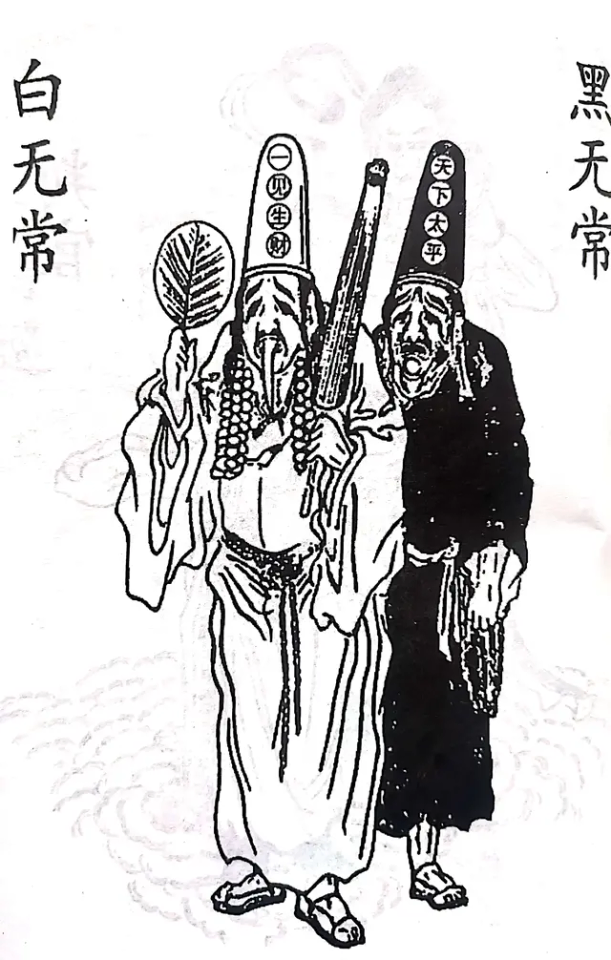
"Glad you asked!" The taller ghost cop, being the cheerful one of the pair, replied. It wasn't very reassuring, considering that his tongue was dangling out of his mouth way further than it should. "I'm the White Impermanence, my sour-looking colleague here is the Black Impermanence, and we are taking you to the City God's office."
This City God, a.k.a. Chenghuang, is just like how it sounds: the divine guardian of a city, who also pulls double duty as the head of the local Dead People Customs Office. They are usually virtuous officials deified posthumously, and in JTTW, they fall under the category of "Ghostly immortals", together with the Earth Gods a.k.a. Tudi.
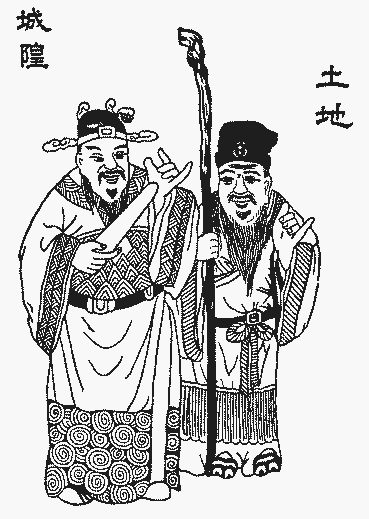
So Xiao Ming went with the two ghost cops——not like he had much of a choice, made his way through the long queue at the City God's office, and was now standing in front of a gruff old magistrate in traditional robes.
"Name?"
"Wang Xiao Ming."
"Age and birth dates?"
"21, April 16 2003…"
After he was done asking questions, the City God flipped through his ledger, then picked up a brush, ticked off Xiao Ming's name, and told him to go get his pass in the next room. More waiting in a queue. Wonderful.
"I never heard anything about needing a pass to get to the Underworld," the girl in front of Xiao Ming asked the ghost cops, who were standing guard nearby. "Is this a new policy or something?"
"Yeah. In the old days, we'd just drag y'all straight to the Ghost Gate." The ghost cop in black said, then muttered to himself, "Fuckin' paperworks and overpopulation, man…"
(This "Dead People Passport" thing was popularized in the middle-to-late Ming dynasty, as shown by the discovery of such documents inside tombs in southern China. )
(It might have evolved from similar passes to the Western Pure Land in lay Buddhism that recorded their acts of merits. Which, in turn, might be traced back to the "Dead People Belongings List" of Han dynasty, to be shown to Underworld bureaucrats so that no one would take away the dead's private property down there or something.)
Anyways, after he received his pass, Xiao Ming departed together with the rest of the bunch, to be led to the Ghost Gate. It was like the world's most depressing tourist group, where instead of tour guides, you got two ghost cops in funny hats, and the only scenery in sight was the desolation of the Yellow Spring Road.
They weren't the only travellers on the road, though. Xiao Ming noticed other groups moving in the far distance, behind the fog and the flickering ghostfire, led by similar figures in black and white.
It made a lot of sense; realistically, there was no way two ghost cops could fetch hundreds of thousands of dead people all by themselves.
(SEA Tang-ki mediums believed there were multiple Tua Di Ya Peks——Hokkien name for the Black and White Impermanences, working for different Underworld Courts.)
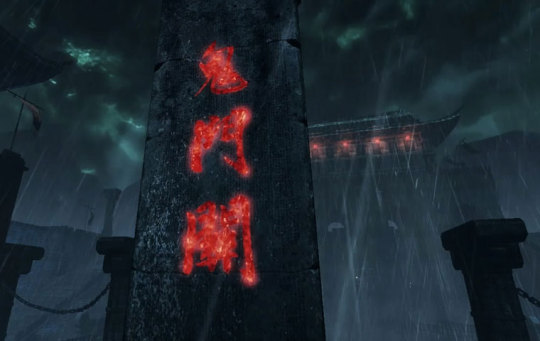
At last, the Ghost Gate stood in front of Xiao Ming, guarded by two towering figures. Normally, they'd be Ox-Head and Horse-Face, like what you see at Haw Par Villa's Underworld entrance.
However, older Han dynasty works like Wang Chong's 论衡·订鬼 also mentioned two gods, Shenshu and Yulei, as guardians of the Ghost Gate, who would use reed ropes to capture malicious ghosts and feed them to tigers, making them possibly the earliest incarnation of "Gate Gods".
So here, they were what Xiao Ming sees, standing side by side like proper doormen, silently watching herds of ghosts being funneled through the entrance.
The place was more crowded than a train station during the CNY Spring Rush; the ghost cops had already said their quick goodbye and left to fetch the next group of dead people, leaving the resident officials of the Underworld proper to maintain order and quell any would-be riots.
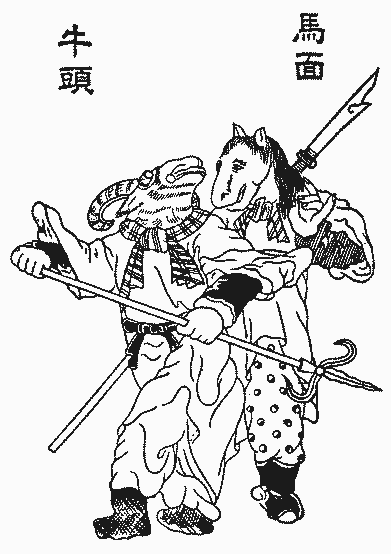
Now you started seeing the Ox-Head and Horse-Face guys, poking at unruly ghosts with their pitchforks and dragging away the violent ones in chains. Among their ranks were other monstrous beings, blue-faced yakshas and imps, but also regular dead humans who look 100% done with their jobs, like the lady who stamped Xiao Ming's pass when it was finally his turn.
After this point, Xiao Ming had entered the Underworld proper, and his next destination would be the First Court, led by King Qin'guang. Here, his fate should be decided by what is revealed in the King's magical mirror.
If Xiao Ming was a good guy, or someone who had done an equal amount of good and bad things in life, he'd be sent straight to the Tenth Court for reincarnation. However, if the mirror, while replaying his life events, had displayed more evil deeds than good ones, he'd be sent to one of the 2nd-9th Courts for judgment and then punished inside the Eighteen Hells.
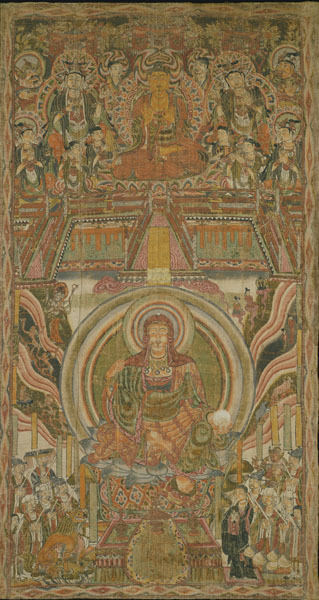
Each of the Ten Kings was also assisted by ghostly judges. Many of them were righteous and just officials in life who had been recruited into the Ten Courts posthumously——Cui Jue from JTTW is one such example, while others were living people working part-time for the Underworld, like how Wei Zheng, Taizong's minister, works part-time for the Celestial Bureaucracy in JTTW.
We decide to be nice to Xiao Ming, so, after reliving some embarrassing childhood incidents and cringy teenage phases in front of a bunch of dead bureaucrats, he was found innocent and sent to the Tenth Court.
The queue here was almost as long as the First Court's, stretching on and on alongside of the banks of the Nai River. King of the Turning Wheel made his judgment without even lifting his head when it was Xiao Ming's turn:
"Path of Humans, male, healthy in body and mind, ordinary family. Next!"
Exiting the Tenth Court building, Xiao Ming saw the Terrace of Forgetfulness, standing tall before six bridges, made of gold, silver, jade, stone, wood, and…some unidentified material. Before he could get a good look at them and the little dots moving across those bridges, he was hurried into the Terrace by the ghostly officials.
Now, both JTTW and the Jade Records mention multiple bridges across the Nai River. In the former, there is 3, and the latter, 6. The bridges made of precious materials are for people who will reincarnate into better lives, as the wealthy, the fortunate, and the divine, while the Naihe Bridge is either the common option or the terribad shitty option.
However, the Naihe Bridge proved to be so iconic, it became THE bridge you walk across to reincarnate in popular legends.
Anyways, back to Xiao Ming. He found himself standing in a giant soup kitchen of sorts, with an old lady at the counter, scooping soup out of her steaming pot and into one cup after another.
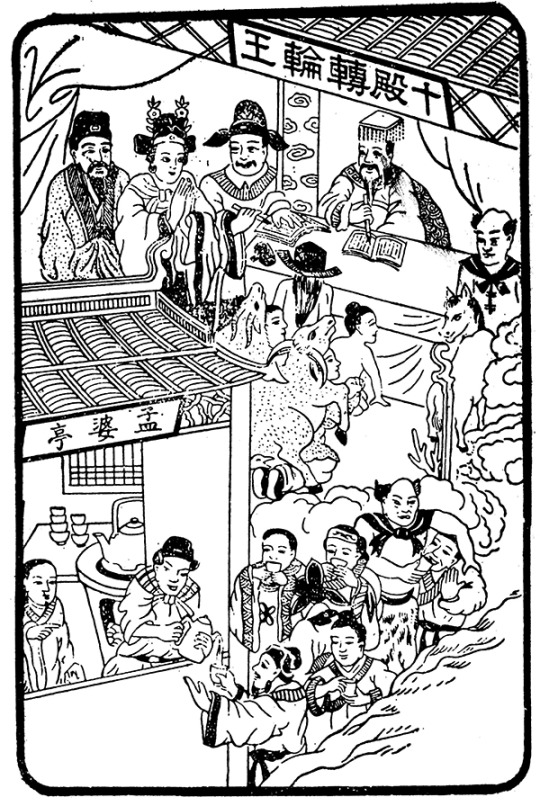
This is Mengpo, the amnesia soup granny; according to the Jade Records, she was born in the Western Han era, and a pious cultivator who thought of neither the past nor the future, only knowing that her surname was Meng.
Made into an Underworld god by the Jade Emperor, she cooks a soup of five flavors that will wipe the memory of the dead, making sure they do not remember any of their past lives once they reincarnate.
It tastes awful. Like what you get after pouring corn syrup, coffee, chilli sauce, lemon juice and seawater into the same cup.
Such was Xiao Ming's last thought, as he gulped down the soup, and then he knew no more.
Things you should know about the Chinese Underworld:
1. It's not the Christian Hell.
Rather, the Chinese Underworld functions somewhat like the Purgatory, in that there are a lot of torment, but the torment's not eternal, however long the duration may be. Once you finish your sentence, you get reincarnated as something else, though that "something else" is not a guaranteed good birth.
Other people can also speed up the process via transferring of merits: hiring a priest/monk to chant sutras and perform rituals, for example, or performing good deeds in life in dedication to the dead, or they can pray to a Daoist/Buddhist deity to save their loved ones from a dreadful fate.
Interestingly enough, a thesis paper I read mentions that, whereas Buddhist salvation from the Hells was based on transference of merits——you give monks offerings and pay them to chant sutras, so they can cancel out the sinners' bad karma with good ones, Daoist ideas of salvation tend to involve the priest going down there, sorting it out with the Underworld officials, and taking the dead out of the Hells themselves.
(The paper also stops at the Northern-Southern and Tang dynasties, so the above is likely period-specific.)
2. Nor is it run by evil demons.
Underworld officials are not nice guys and look pretty monstrous and torture the sinful dead, but they are not the embodiment of evil. Rather, the faction as a whole is what I'd call Lawful Neutral, who function on this "An Eye for An Eye" logic, where every harm the sinner caused in life must be returned to them, in order for their karmic debts to be cleansed and move on to their next life.
They can absolutely be corrupt and incompetent and take bribes——Tang dynasty Zhiguai tales and Qing folklore compendiums featured plenty of such cases, but that's a very mundane and human kind of evil, not a cosmic/innate one.
This is just my personal opinion, but if you want to do an "evil" Chinese Underworld? It should be a very bureaucratic evil, whose leaders are bootlickers to the higher-ups, slavedrivers to their rank-and-file workers, and bullies who abuse their power over regular dead people.
Not, y'know, Satan and his infernal legions or conspiring Cthulu cultists.
3. The Ten Kings are not Hades.
Make no mistake, they still have a lot of power over your average dead mortal. But in the grand scheme of things? They are the backwater department of the pantheon, who only show up in JTTW to get pushed around and revive the occasional dead people.
When Taizong made his trip to the Underworld, the Ten Kings greeted him as equals——kings of ghosts to the king of the living. If they see themselves as equal in status to a mortal emperor, then, like any mortal emperors, they are subordinate to the Celestial Host, and the balance of power is not even remotely equal or in their favor.
Also, it isn't said outright, but under the Zhong-Lv classification of immortals JTTW is using, Underworld officials will likely be considered Ghostly immortals, the lowest and weakest of the five types, much like Tudis and Chenghuangs.
Essentially: they are ghosts that are powerful enough to not reincarnate and linger on and on, spirits of pure Yin as opposed to true immortals, who are beings of pure Yang.
It's pretty much the shittiest form of immortality, the result you get when you try to speedrun cultivation (the Zhong-Lv text also made a dig at Buddhist meditation here), and if they don't reincarnate or regain a physical body, there is no chance of progressing any further.
Oh, and fun fact? In the Song dynasty, commoners and literati elites alike believed that virtuous officials in life would get appointed as ghostly officials in death.
However, the latter viewed it as a punishment. Which was strange, considering how they still held the same position and the same amount of authority, just over dead people instead of living ones, so there should be no big losses, right?
Well...it was precisely the "dead people" part that made it a punishment. See, a lot of the power and prestige they had as officials came from the benefits they could bring to their families and kins and native places, as well as the potential wealth and reputation bonuses for themselves.
A job in the Dead People Supreme Court would give them the same workload, but with none of those benefits. Since all the dead people had to reincarnate eventually, they couldn't have a fixed group as their power base, or keep their old familial ties and connections. At most, they could help out an occasional dead relative or two.
Like, working for the Underworld Courts was the kind of deadend (no pun intended) job not even living officials wanted for themselves in the afterlife. That's how hilariously sad and pathetic they are.
4. In JTTW at least, they aren't even the highest authorities of the Underworld.
That would be Bodhisattva Ksitigarbha, who is technically their boss, though he seems to be more of a spiritual leader than someone who is actually involved in running the bureaucracy.
Which makes sense, since he has sworn an oath to not attain Buddhahood until all Hells are empty, and his role is to offer relief and salvation to the suffering souls, not judging and punishing them.
Now, historically...even though Ksitigarbha in early Tang legends was still the savior of the dead, he seemed to be unable to interfere with the judicial process of the Underworld, merely showing up to take people away before they were judged by King Yama.
However, in the mid-Tang apocryphal "Sutra of Bodhisattva Ksitigarbha" (地藏菩萨经), he had evolved into the equal of King Yama, with the power of supervision over his judgements. By the time the Scripture on the Ten Kings came out, in artistic depictions, the Ten Kings had become fully subservient to him.
5. Diyu usually refers to the prison-torture chamber part, not the courthouse, nor is it the entirety of the Underworld.
And for the majority of souls that haven't committed crimes, they'll only see the courthouse part before they are sent to reincarnation. That's why I personally don't like, or use the name Diyu for the Chinese Underworld: I prefer the term Difu ("Earth Mansions"), which encompasses the whole realm better.
Also: even though historical sources like the Scripture on the Ten Kings and Jade Records seem to suggest that the dead were just funneled through this Courthouse-Prison-Reincarnation pipeline with no breaks in between, in practice, that isn't the case.
According to popular folk beliefs, after the dead were done with their trials/sentences, they stayed in the Underworld for a period of time and led regular lives, while functioning as ancestor spirits and receiving offerings.
Which would imply that the Underworld had a civilian district of sorts, populated by regular ghosts, making the whole realm even less of a direct Hell/Purgatory equivalent.
6. It is located in a different realm, but still part of the Six Paths and doesn't exist outside of reality.
In Buddhist cosmology, like the Celestial Realm, the Underworld is part of the Realm of Desires and thus subject to all the woes of samsara.
The pain and misery of the Path of Hell may be the worst and most obvious, but becoming a celestial being isn't the goal of serious Buddhists either: despite all the pleasures and near-infinite lifespan they enjoy, they are not free from samsara and will eventually have to reincarnate.
So if, say, the world is being destroyed at the end of a kalpa, all beings of the Six Paths will perish alongside it, leaving behind a clean slate for the cycle to start anew. The dead won't all end up in the Underworld and face eternal damnation.
7. The Black and White Impermanences would not appear in the Underworld pantheon formally until the Qing dynasty.
The concept that when you die, you get fetched to the Underworld by petty ghost bureaucrats is already well-established in Tang legends, but these were just generic ghost bureaucrats in all sorts of colorful official robes, with yellow being the most common color.
The idea of there being two specific psychopomps in black and white would only become popular in the Qing dynasty. Mengpo is kinda similar: although she existed before the Ming-Qing era as a goddess of wind, venerated by boatmen, her "amnesia soup granny" incarnation came from the Jade Records.
#chinese mythology#chinese folklore#chinese underworld#diyu#chinese religion#cw: death#hell#underworld#journey to the west#I'm lazy so if you want a “work cited” list#just dm me
2K notes
·
View notes
Text
I don't even know how to word this in a way that makes sense and I think in an overall world building sense this is a major case of "Man I think it depends" but I actually don't think Spite is a "demon".
Spirits and Demons are essentially the same, yes, and I think there's much to be said about this in in parallel to a healthy person vs a deeply traumatized person, but to quote Neve, "one is more likely to manipulate you, or kill you," etc etc.
A demon is a spirit whose purpose has been twisted. And I don't think Spite's purpose has been twisted much at all.
Determination's purpose is "accomplish my goal (whatever that may be)". Spite (the emotion)'s purpose is exactly the same, with the added benefit of "especially against the wishes of others".
I think the demonic version of Determination would be "Ruthlessness", not Spite.
Spite (the guy) is not wholly consumed by his purpose like other "demons" are. He doesn't pursue his goals at the expense of his companions. He has several other interests even if they seem a little silly (learning what tastes good, or even new forms of combat like fire). And he tells us his purpose several times...it's his promise with Lucanis! Escape, kill, and live! This goal is one of determination and it has not changed by his becoming Spite. The goal is not warped in any way even with his joining to Lucanis.
Bellara speculates as to why Spite doesn't just take Lucanis over or turn him into a nasty mound of flesh. I want to argue that this is because Spite is a named spirit, not a demon.
What's more spiteful than not allowing your captors to change you? What says fuck you to people who would use you as a tool than self-determination? What's more spiteful than being determined to be free, to fight who would enslave you, to live?
My working theory is that Spite is not a demon in the same sense as, say, Wisdom being corrupted into Pride, which twists a desire to guide, teach, or navigate situations with care into a desire to be right and unchallenged.
I think Spite is to Determination as Eulogy is to Compassion.
#spite dragon age#dragon age veilguard#da veilguard#lucanis dellamorte#lucanis#spite dellamorte#i got a really old but powerful academic urge to write a ten page paper with cited sources on this today#arent they just so perfect together#a shade and a wounded spirit etc etc#they work because they are the same! they want to live and be free! and fuck everybody else!#datv#veilguard#dragon age#cathedralposting#i need to put spite in a little petri dish and study him#this has been said before but I'll say it again
974 notes
·
View notes
Text
no one told me that Stephen King's On Writing calls the entire fantasy genre out as Tolkien fanfic. all I ever heard about this book was that he's anti-adverbs (he is) but there is some scathingly mean and funny shit here.
#i am rapidly becoming very fond of this book#but also#i think all those dudes on writing forums who cite it like it's the deep magic?#i'm questioning them#to be clear i don't think 'your work is essentially fanfic' is an insult because i love fanfic#but i know a lot of those guys who love this book do not love the fic
242 notes
·
View notes
Text
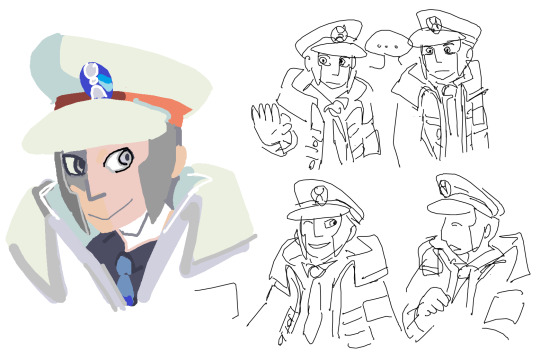

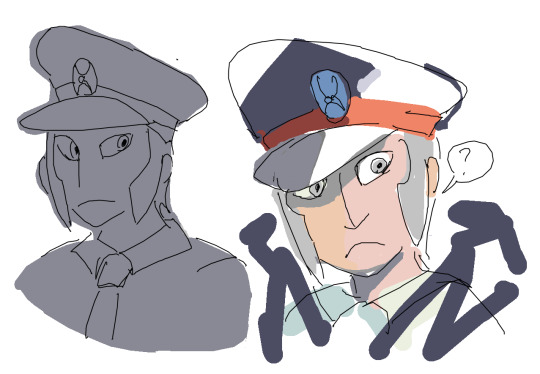
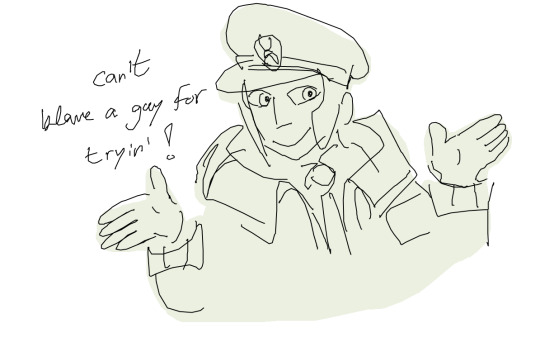
finally got my hands on the BW manga thanks to: YOU GUESSED IT, THE PUBLIC LIBRARY!
#these drawings have nothing to do with that#i'm just happy to have it#pokemon#submas#emmet#ingo#I FEEL LIKE I CAN'T GET THEIR EYES RIGHT. BUT I THINK I AM GETTING CLOSER#but yes about the manga. i am really a big fan of the battle subway being a very recent facility in the region#the idea too that emmet and ingo were like sought out specifically to be the heads is kind of interesting. because he cites#their qualifications as like being really strong trainers#but not railway. work? experience?#i kind of wonder what the hiring process was like LOL#i'm still a fan of the battle subway being something they built from the ground up but you know. it's cool!
179 notes
·
View notes
Text
I'm thinking a little bit about atonement tonight and there's so much support on tumblr for the humanist view of the crucifixion as God's act of solidarity with humanity. and I don't disagree with this. I think that's part of it. but I would ask: what is salvific about the crucifixion and resurrection if it's only an act of solidarity? if it's just to feel our pain, how are we redeemed? without atonement, without redemption, without salvation, we have a Good Friday that never rises into Easter. so there is atonement. but it's not that God demands blood, or exactly penal substitionary atonement, or divine child abuse. it's that sin, the abuse of our free will, has consequences. natural consequences: inequality, broken relationships, pain, death. it's not just our own sin; the sin of all humanity is like a web that we can't free ourselves from, and the spider is coming.
until God steps into those consequences and bears them for us, because God can bear the weight and remain God. we cannot. this is why Jesus has to be fully human and fully divine: if he's not human then we aren't saved. and if he's not divine he is destroyed. it's not just solidarity. it's a saving act. it's something only God can do. and God does it purely out of love for the creation that God made good and will make good until all is perfected at the end of time.
#works cited: synthesized from lectures of Dr. Lois Malcolm#christianity#good friday#soteriology#atonement#what's the name for this theory of atonement. I think it's#christus victor#if I am doing justice to aulen and the patristic ideas of atonement#anyway. guess who's supposed to be doing history I homework right now
177 notes
·
View notes